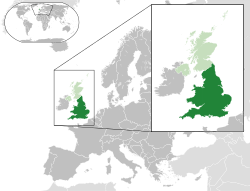Law Commission (England and Wales)
British independent law commission From Wikipedia, the free encyclopedia
British independent law commission From Wikipedia, the free encyclopedia
In England and Wales the Law Commission (Welsh: Comisiwn y Gyfraith) is an independent law commission set up by Parliament by the Law Commissions Act 1965[1] to keep the law of England and Wales under review and to recommend reforms. The organisation is headed by a Chair ((currently Sir Peter Fraser) a judge of the Court of Appeal) and four Law Commissioners. It proposes changes to the law that will make the law simpler, more accessible, fairer, modern and more cost-effective. It consults widely on its proposals and in the light of the responses to public consultation, it presents recommendations to the UK Parliament that, if legislated upon, would implement its law reform recommendations. The commission is part of the Commonwealth Association of Law Reform Agencies.
Comisiwn y Gyfraith | |
 Law Commission logo | |
 England and Wales within the UK and Europe | |
| Established | 1965 |
|---|---|
| Type | Advisory non-departmental public body sponsored by the Ministry of Justice |
| Legal status | Created by the Law Commissions Act 1965 |
| Purpose | To keep the law of England and Wales under review and to recommend reform where needed |
| Headquarters | 52 Queen Anne's Gate, London SW1H 9AG |
| Coordinates | 51.5003°N 0.1341°W |
Region served | Primarily England and Wales Occasionally Northern Ireland Rarely the Crown dependencies and the British Overseas Territories |
Official languages | De jure: English and Welsh De facto and working language: English |
Chair | Sir Peter Fraser |
Chief Executives | Joanna Otterburn and Roshnee Patel |
| Website | www |
The Law Commissions Act 1965 requires the Law Commission to submit "programmes for the examination of different branches of the law" to the Lord Chancellor for his approval before undertaking new work.
Every three or four years the Law Commission consults widely, asking for suggestions for projects to include in these programmes.
Decisions about whether to include a project are based on:
The Law Commission can also take on additional projects that are referred directly by Government departments.
At any one time, around 15 to 20 areas of law will be under review. Law Commission projects cover a wide range of subjects that belong to the criminal law, property law, family and trust law, public law, commercial law.
The Law Commission has a rolling programme of law reform projects, and every three years or so it consults on any new projects that should be added to the list of those that it already has under way. In December 2017 it published its 13th Programme of Law Reform.[2]
Approximately 70% of the Law Commission's law reform recommendations have been enacted or accepted by Government.[3]
The current commissioners are:[4]
The chair of the Law Commission is usually a High Court judge. Chairs are often promoted to the Court of Appeal. Until 2008, promotion would occur soon after or shortly before the end of their term as chair, with one exception: Samuel Cooke (whose term as chair ended with his death in 1978).[5] Terence Etherton was promoted to the Court of Appeal approximately two years into his term. The most recent incumbents were appointed near the beginning of their terms.[6]
Seamless Wikipedia browsing. On steroids.
Every time you click a link to Wikipedia, Wiktionary or Wikiquote in your browser's search results, it will show the modern Wikiwand interface.
Wikiwand extension is a five stars, simple, with minimum permission required to keep your browsing private, safe and transparent.